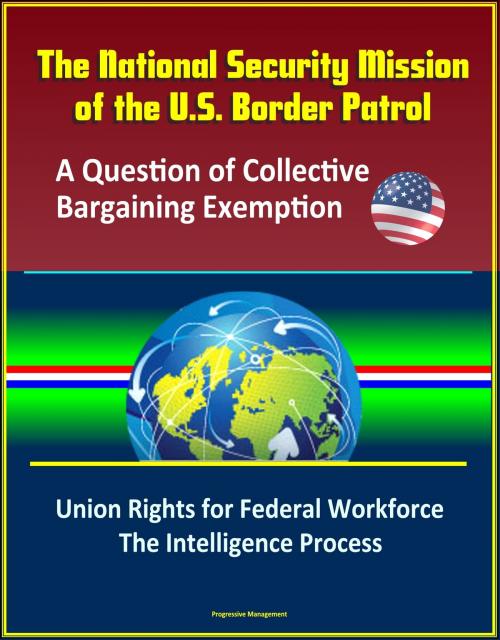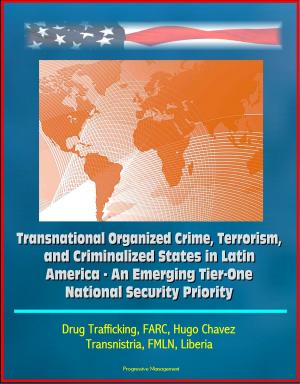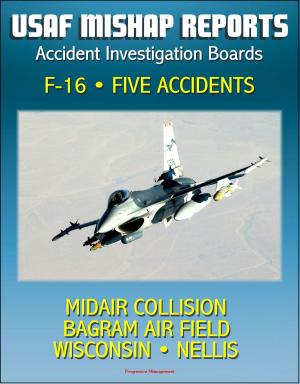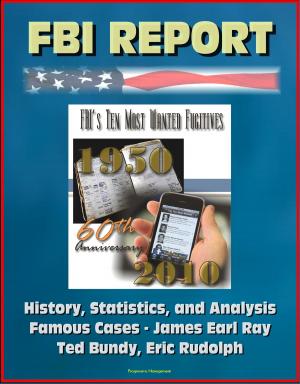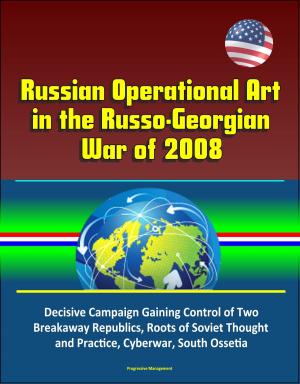The National Security Mission of the U.S. Border Patrol: A Question of Collective Bargaining Exemption - Union Rights for Federal Workforce, The Intelligence Process
Nonfiction, History, Military, United States, Social & Cultural Studies, Political Science, Government| Author: | Progressive Management | ISBN: | 9781370242900 |
| Publisher: | Progressive Management | Publication: | January 22, 2017 |
| Imprint: | Smashwords Edition | Language: | English |
| Author: | Progressive Management |
| ISBN: | 9781370242900 |
| Publisher: | Progressive Management |
| Publication: | January 22, 2017 |
| Imprint: | Smashwords Edition |
| Language: | English |
This excellent report has been professionally converted for accurate flowing-text e-book format reproduction. This study examines the pre- and post-September 11, 2001 mission, responsibilities, and duties of the U.S. Border Patrol in order to determine the applicability of collective bargaining exemption. These factors are analyzed in the context of specific criteria identified in the legislation creating the Department of Homeland Security. The conclusions are then weighed with respect to other entities, including Department of Defense entities, that have been granted collective bargaining exemptions to determine the potential impacts.
The inclusion of the U.S. federal workforce into the realm of collective bargaining is a relatively recent occurrence. This happened during the 1960s when President John F. Kennedy issued Presidential Executive Order 10988 granting union rights to federal employees. Presidents Richard Nixon and Jimmy Carter expanded union rights for federal employees. These expansions led to the enactment of the Civil Services Reform Act of 1978. Soon after, however, President Carter issued Presidential Executive Order 12171 that provided exemptions to collective bargaining for specific departments, organizations and offices. The common characteristic of these entities and thus the reason for their exemption was their national security mission. President Carter's executive order reflected a view that the consequences of failing to accomplish the mission of national security were more important than any benefit attained through collective bargaining. Several future presidents shared this belief and made nine amendments to President Carter's original Executive Order, adding additional entities they deemed should also be exempt from collective bargaining.
The September 11, 2001 terrorist attacks resulted in the creation, via the Homeland Security Act of 2002, of the Department of Homeland Security (DHS)—a merger of several existing law enforcement, inspection, and intelligence organizations and the creation of some new entities—with a specific mission of safeguarding the United States from future attack. One new agency created within DHS was Customs and Border Protection (CBP). CBP consolidated several entities and changed their respective primary missions from enforcement and inspection to national security.
The adoption of a national security mission for the entities within DHS should have been accompanied by a requisite collective bargaining exemption extended to others with a similar mission. This, however, did not occur. This inconsistency demands an answer to the following questions. Considering its current national security mission, should the U.S. Border Patrol, an office within DHS, be exempt from collective bargaining? What are the conditions that must be met in order to qualify for exemption? Have these criteria been met considering the pre- and post-September 11 mission and responsibilities of the U.S. Border Patrol?
This excellent report has been professionally converted for accurate flowing-text e-book format reproduction. This study examines the pre- and post-September 11, 2001 mission, responsibilities, and duties of the U.S. Border Patrol in order to determine the applicability of collective bargaining exemption. These factors are analyzed in the context of specific criteria identified in the legislation creating the Department of Homeland Security. The conclusions are then weighed with respect to other entities, including Department of Defense entities, that have been granted collective bargaining exemptions to determine the potential impacts.
The inclusion of the U.S. federal workforce into the realm of collective bargaining is a relatively recent occurrence. This happened during the 1960s when President John F. Kennedy issued Presidential Executive Order 10988 granting union rights to federal employees. Presidents Richard Nixon and Jimmy Carter expanded union rights for federal employees. These expansions led to the enactment of the Civil Services Reform Act of 1978. Soon after, however, President Carter issued Presidential Executive Order 12171 that provided exemptions to collective bargaining for specific departments, organizations and offices. The common characteristic of these entities and thus the reason for their exemption was their national security mission. President Carter's executive order reflected a view that the consequences of failing to accomplish the mission of national security were more important than any benefit attained through collective bargaining. Several future presidents shared this belief and made nine amendments to President Carter's original Executive Order, adding additional entities they deemed should also be exempt from collective bargaining.
The September 11, 2001 terrorist attacks resulted in the creation, via the Homeland Security Act of 2002, of the Department of Homeland Security (DHS)—a merger of several existing law enforcement, inspection, and intelligence organizations and the creation of some new entities—with a specific mission of safeguarding the United States from future attack. One new agency created within DHS was Customs and Border Protection (CBP). CBP consolidated several entities and changed their respective primary missions from enforcement and inspection to national security.
The adoption of a national security mission for the entities within DHS should have been accompanied by a requisite collective bargaining exemption extended to others with a similar mission. This, however, did not occur. This inconsistency demands an answer to the following questions. Considering its current national security mission, should the U.S. Border Patrol, an office within DHS, be exempt from collective bargaining? What are the conditions that must be met in order to qualify for exemption? Have these criteria been met considering the pre- and post-September 11 mission and responsibilities of the U.S. Border Patrol?
